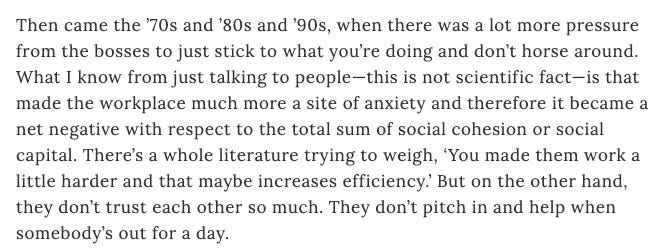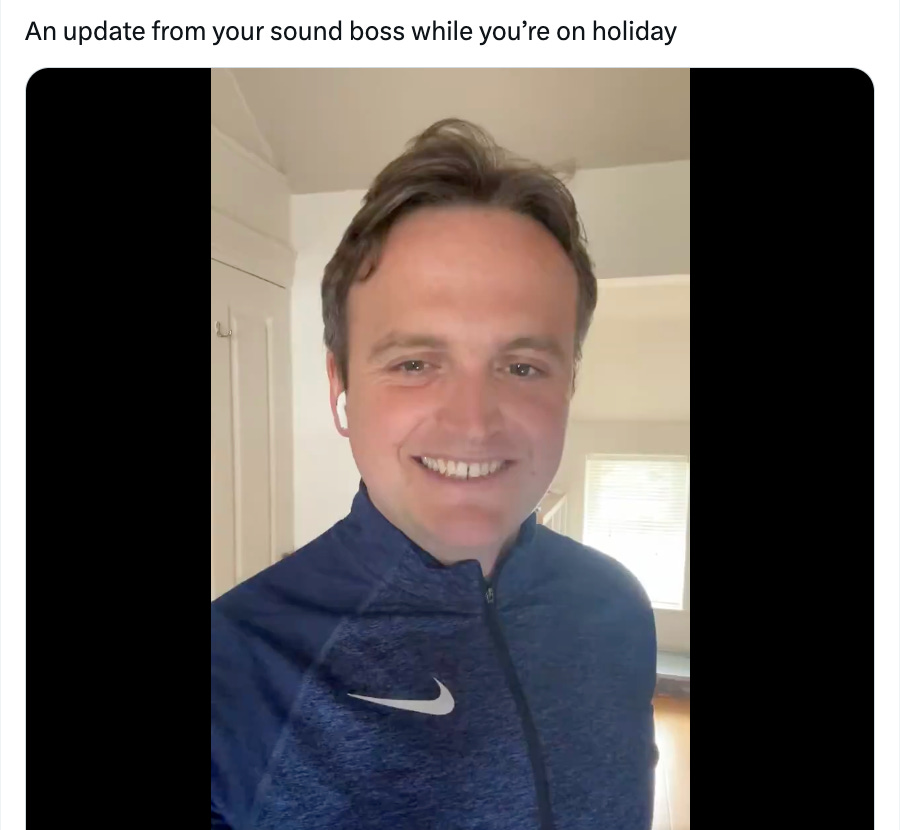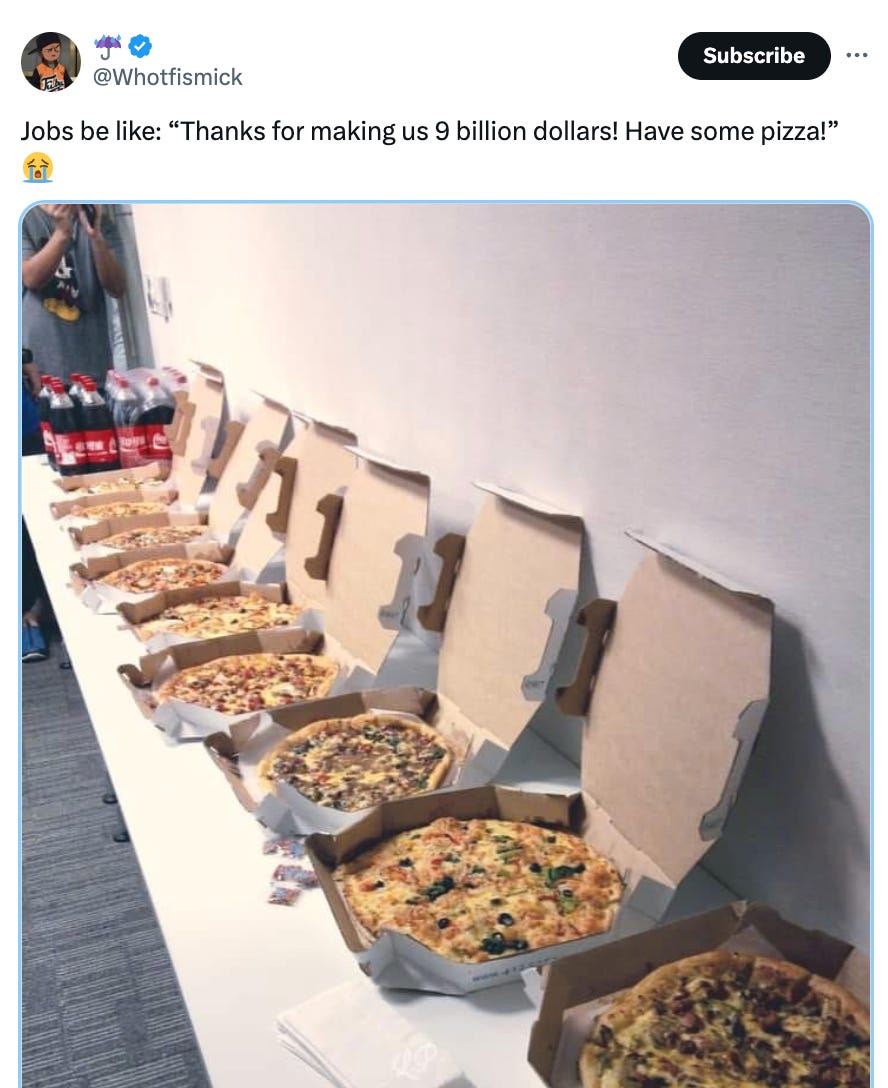Loneliness at work might have a simple solution
I know what you missed this summer... all the best workplace insight
Back to school after a summer’s break Make Work Better is fully back at it - and there’s lots of workplace culture content coming up in the next few weeks.
There’s some fabulous content coming up tackling themes like:
Should we focus on making our workers happy?
How to fix a toxic culture
Practical tips to help strengthen your own team from Owen Eastwood
What can we learn from the service industry?
As a back-to-work kick-off here are some of the best links from the past few weeks.
Loneliness at work is a top challenge for organisations right now
The look & feel of the office is set to continue evolving
WFH has always been fine for bosses, less so for workers
The impact of bosses who use the word ‘we’ rather than ‘you’
Exercise might be the ultimate wellness program
Your sound boss just needs a quick call on your holiday
Do phones and social media ruin kids’ mental health?
Loneliness at work is a top challenge for organisations right now
Robert Putnam, an American social scientist who became famous for his book ‘Bowling Alone’ which observed how society was becoming increasingly disconnected, gave a fascinating interview this week where he talked about the way that workplaces are providing less in the form of friendship, and the invisible consequences of that.
Putnam says that he’s observed that when bosses run drives to reduce chatter and to push efficiency it’s accidentally ended up reducing the trust between colleagues:
This creates a paradoxical relationship where 'on balance, [workers] were more efficient when they could hang out at the water cooler'.
Putnam flinches at the idea of office mandates and thinks that cohesion is built in curating fun moments of togetherness. A really good read.
The look of the office is set to continue evolving
“More people will want to work and live somewhere that feels like a community” - a fascinating discussion about real estate (what will the office of the future be like) suggesting that mixed-use areas, where offices sit side-by-side with residential and retail properties, is what people are increasingly demanding: (Also includes commentary that ‘the office of the future is more a network than a place’ - a network that facilitates working together in multiple places as required).
WFH has always been fine for bosses, less so for workers
Starbucks' new CEO, Brian Niccol, faced criticism following revelations that he will be working mainly from home (apart from when he’s commuting nearly 1,000 miles from California to the company's Seattle headquarters using a corporate jet - BBC). The Starbucks hybrid policy is three days a week in the office, hopefully HR won’t need to send him a reminder.
It’s not you, it’s erm, us
Bosses who use the word ‘we’ rather than ‘you’ get better results from giving tough feedback says new research. It was found that using the word ‘you’ tended to activate a defensive response and made colleagues less likely to be receptive. I found that article marginally better than this one from the Wall Street Journal, which along the way tries to reframe feedback as ‘feedforward’ (sure, that won’t make people feel manipulated).
Exercise might be the ultimate wellness program
‘Every hour of intense exercise you perform extends your life by seven hours, every hour of any exercise extends your life by five’. This episode of Derek Thompson’s Plaint English is an outstanding listen.
Time to double-click on that one
Esoteric business language can often assail us when we join a new job. It’s a subconscious code of identity, a signal of whether someone belongs or is a noob. Do you even understand how things are done around here? Relatedly, I remember someone telling me I didn’t do slides ‘in the Google way’ when I joined the tech giants which when surrounded with people who seemed to be speaking in code was an additional source of anxiety. “Let’s double-click on that one” is the latest jargon du jour.
Beware of labelling AI ‘all hype’
Over the last couple of months there’s been a cycle of experts saying that AI is being over hyped, which contributed to Nvidia’s stock price dropping by 13%. But if you look closely there have been some concrete examples of firms getting real world results from the deployment of AI projects.
Amazon’s CEO Andy Jassy said that the firm was using it to save ‘4500 developer- years of work’. Walmart say they used LLMs to fix the cataloging of almost a billion items of inventory in their inventory
Other links:
“I’d have been better off doing this call at home…” - the unstoppable rise of the office pod
Do phones and social media ruin kids’ mental health?
If you’ve been in anyway convinced by (or just tempted to read) Jonathan Haidt’s The Anxious Generation then you should listen to this outstanding episode of If Books Could Kill, a podcast where they study the science of airport bestseller books to see if they stand up to scrutiny. It’s a brilliant listen, which is often generous to Haidt on edge cases but concludes that saying that phones cause teenage depression is just simply untrue. Add it to your podcast queue - it’s worth it.









I always use 'we' when talking to my team (when I have one, I'm making do with bossing around my family and the dogs at the moment), but I found I had to learn to say "I" in job interviews. After using 'we' for so long it was hard to switch!
Re pods - I often see people sitting on the floor in them too (and have been known to do that myself, which prompted a colleague to come and check if I was okay). That tiny bit of extra privacy allows unmasking in a way that just isn’t possible in the completely open office.